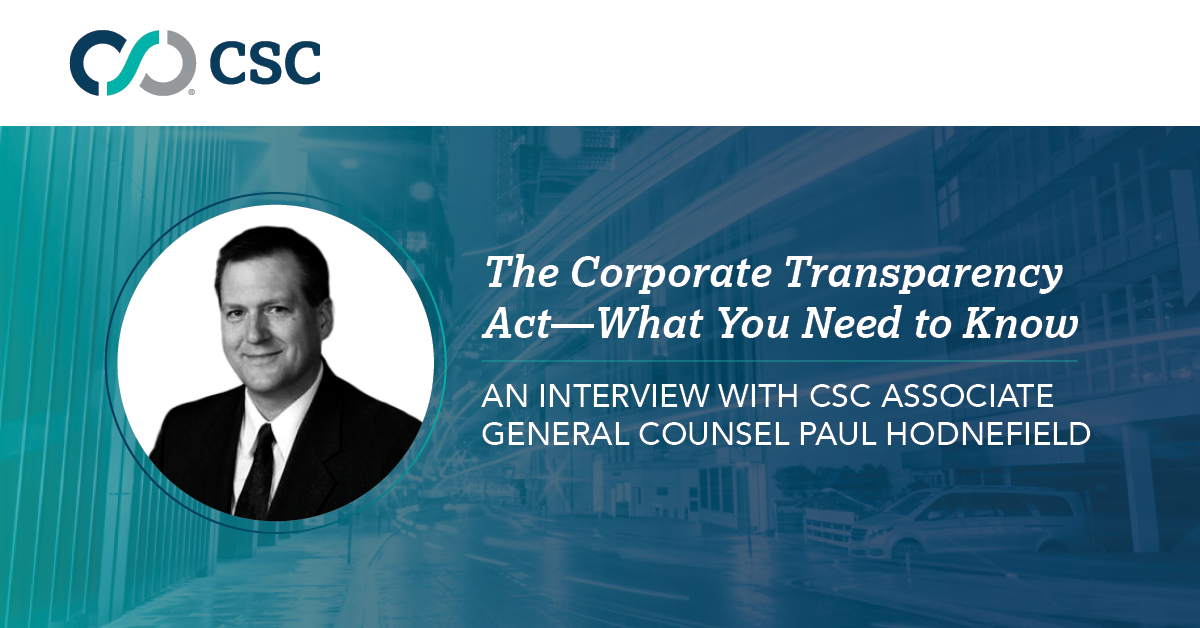
The Corporate Transparency Act (CTA) legislation introduces beneficial ownership reporting requirements for new and existing companies. The new CTA reporting requirements apply to corporations, limited liability companies, and other entities that fall within the CTA’s definition of “reporting company.” The beneficial ownership information will be collected and accessed through the Financial Crimes Enforcement Network (FinCEN), a branch of the U.S. Department of the Treasury.
The CTA goes into effect on January 1, 2024, leaving impacted organizations with many questions, including how best to track the information required. CSC sat down with CSC’s associate general counsel, Paul Hodnefield, to clarify the information currently available from FinCEN.
Why does my company need to report beneficial ownership information to the U.S. Department of Treasury?
Unless a company falls within one of the numerous exceptions to the definition of “reporting company,” it must report beneficial ownership information to FinCEN so law enforcement has access to the information to aid in money laundering and terrorist financing investigations.
When do the new reporting requirements take effect?
Beginning on January 1, 2024, all newly formed reporting companies will have to report the required information to FinCEN within 30 days of formation. Reporting companies already in existence as of December 31, 2023 will have until January 1, 2025 to report the required information to FinCEN. Foreign companies doing business in the U.S. will also have similar requirements. Foreign reporting companies registered in the U.S. before January 1, 2024 have until January 1, 2025 to report this information. Any foreign reporting company that registers in the U.S. after January 1, 2024 must report to FinCEN within thirty days of registration.
What information will a reporting company need to report about its beneficial owners?
The following information must be provided for each beneficial owner: (i) full legal name; (ii) date of birth; (iii) current residential or business street address; and (iv) a unique identifying number from an acceptable identification document. In addition, the reporting company must provide a legible image of the identification document corresponding to the unique identifying number.
What information will a reporting company have to report about itself?
The following information must be provided for each reporting company: (i) full legal name of the reporting company; (ii) all trade names, fictitious names, or doing business as (DBA) names, regardless of whether the name is registered; (iii) street address of principal place of business; (iv) jurisdiction of formation (state or tribal); and (v) IRS taxpayer identification number (TIN).
Does my company have to report company applicants, and what information is required?
If your company falls within the definition of a reporting company, it will need to report information about itself, all beneficial owners, and up to two company applicants.
Who is considered a company applicant
The final FinCEN rule defines “company applicant” as an individual natural person who either (i) directly files the document to create a domestic reporting company or register a foreign reporting company; and (ii) is primarily responsible for directing or controlling such filing if more than one individual is involved in the process.
When, where, and in what format will the information need to be reported?
At first, FinCEN may require reporting on paper forms designed for that purpose. However, FinCEN expects that eventually reports will be submitted electronically using an online interface. Alternative submission methods are still under consideration if circumstances prevent a person from submitting the report electronically. FinCEN is also considering the use of batch submissions through service companies that build a direct interface, but that’s a low priority and the issue remains undecided.
Where will the reported information be stored and who will have access?
FinCEN will store and maintain all reported information in the Beneficial Owner Secure System (BOSS). With limited exceptions, the information may only be disclosed to government law enforcement, prosecutors, the courts, and national security agencies. Financial institutions may have access to the information for due diligence purposes with consent of the reporting company. In some cases, the information may be disclosed if requested by a federal agency to assist the law enforcement, courts, prosecutors, or judges of a foreign country.
What services will CSC provide in relation to the CTA?
CSC is assessing what services it can provide to clients. FinCEN has not provided enough information regarding the extent to which third parties will be able to interact with the BOSS system on behalf of reporting companies. As a result, it’s premature for any service company to identify what reporting services it can offer. However, CSC can help manage the necessary information for FinCEN reports. The CSC Entity ManagementSM platform affords clients the ability to maintain sensitive officer and director information, organize corporate data, record ownership information, and securely store documents.
Are there any integrations currently available to FinCEN’s reporting platform?
No. Competitors may assert they can integrate, but they cannot at this time. They may have integrations in other FinCEN systems, but the BOSS system is entirely new and still in development. Consequently, we don’t know when or if FinCEN will allow any third party to build a direct interface.
CSC will continue to provide updates on this law as more information is made available from FinCEN.
Additional resource support available
For more information regarding the Corporate Transparency Act, please reference our Corporate Transparency Act overview and FAQs. Additionally, Paul provided a high-level overview of the CTA and the final FinCEN rule in a recent webinar, available for viewing on-demand.
For more information, please contact your CSC account manager, or you can email us at corpservices@cscglobal.com.
Paul Hodnefield is associate general counsel for CSC, where he’s responsible for advising the company regarding real estate recording, notary, uniform commercial code, and other public record transaction services. Paul is a member of the ABA, the Minnesota Bar Association, and a fellow of the American College of Commercial Finance Lawyers. He’s a 2013 recipient of a National Association of Secretaries of State Medallion Award.